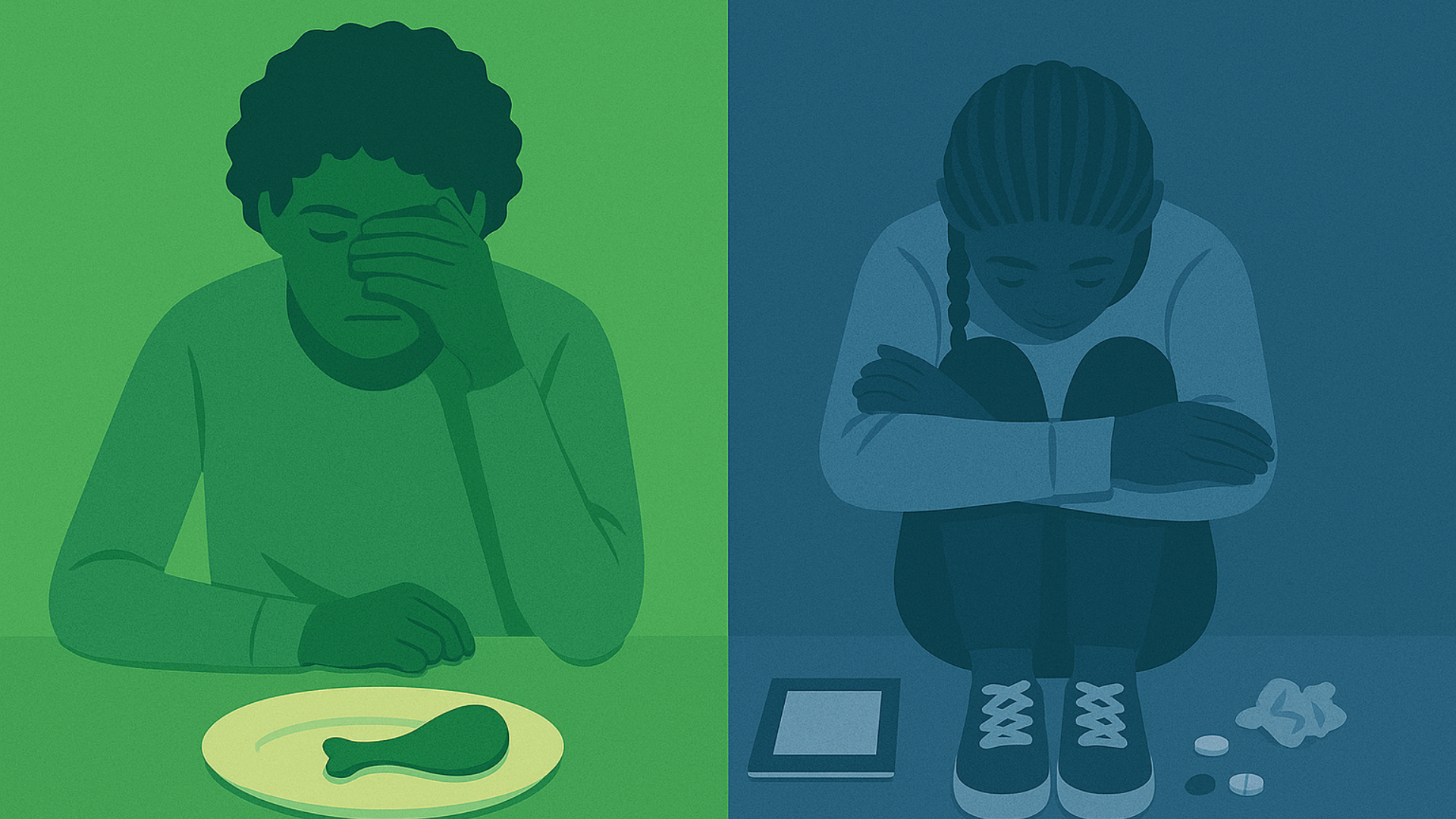Freedom from Eating Disorders - Client Success Story

After struggling with an eating disorder for over 40 years, a Thrive Wellness client was able to achieve lasting recovery. In the Q&A below, this individual shares how their experience at Thrive Wellness helped them find healing.
When did you attend eating disorder treatment at Thrive Wellness?
I began attending eating disorder treatment at Thrive Wellness in September 2021. I completed treatment in May 2022.
Can you describe your eating disorder treatment experience at Thrive Wellness?
During my time in eating disorder treatment at Thrive Wellness, I participated in both the partial hospitalization program (PHP) and the intensive outpatient program (IOP) .
In both programs, I attended group therapy sessions throughout the day. Depending on the program I was in at the time, I received therapeutic meal support for breakfast, lunch, and dinner.
Thrive Wellness’ integrated treatment team approach was one of the most beneficial aspects of my experience. I was able to work on my recovery with a mental health therapist, registered dietitian, and occupational therapist. The clinicians collaborated to provide me with balanced care.
What was your favorite therapy group?
I liked the groups where the clients opened up about their experiences, thoughts, and emotions. Interestingly enough, music therapy invited this honest expression.
The music therapist expertly encouraged the clients to share their inner experiences as they related to songs. The music therapy group allowed individuals to discuss what they were going through and feel supported by the other members, many of whom could relate to their struggles. The group helped me feel like I wasn’t alone in my issues. It also strengthened the bonds between the members.
How was meal support helpful?
At the beginning of a person’s treatment, a registered dietitian would help prepare the client’s plate. For many, it was hard to relinquish control and eat the entire meal. As a client progressed through treatment, they were able to begin self-portioning their food, which could also be a scary experience. Even though the meals were often immensely challenging, they were essential learning moments that taught the clients to nourish themselves beyond what they were accustomed to.
Because my eating disorder was active for so long, nearly 40 years, my mistaken beliefs about nourishment were deeply ingrained. It required a significant amount of effort to reform my judgments around food and learn to accept that food has no moral value . I did my best to push myself out of my comfort zone during meals at Thrive Wellness and tried to consistently choose challenging foods.
Throughout the meal experience, the Thrive Wellness staff and clients supported me. I also encouraged other clients, which helped me shift my focus from my distress. As the clients ate in community with each other, sharing our struggles and support, we were able to learn how to embrace eating disorder recovery along the way.
Is there a food you thought you didn’t like before treatment that you enjoy now?
For me, it’s the opposite. When my eating disorder was active, I tended to binge eat certain foods that I don’t enjoy anymore. Before recovering, I had a restrictive mindset around those specific foods that made me want to eat them more. Now, when I have a couple of bites of those foods, I think, “This isn’t all I thought it was before.”
Were there any Thrive Wellness team members that were especially helpful on your recovery journey?
Meadow Deason, OTD, OTR/L, the occupational therapist, helped me learn to structure my schedule more effectively. Before treatment, I would try to complete an unrealistic amount of tasks in a given day. When I couldn’t get everything done, I’d have feelings of overwhelm, stress, and anxiety because I believed I should be doing more. That distress helped fuel my eating disorder. During my occupational therapy sessions, I learned ways to manage my time better, let go of some expectations, and create more reasonable goals for my daily tasks.
Related: Occupational Therapy: A Holistic Practice For Embracing Life Despite Physical or Mental Limitations
Lorraine Platka-Bird, Ph.D., RD, CEDRD, CDE, the registered dietitian that I worked with helped me make peace with some of the physical struggles and digestive issues I have as a result of struggling with my eating disorder for so long.
Mollie Pierce, M.A., LCPC, NCC, the eating disorder program clinical lead, and my therapist helped me process my thoughts and emotions and made suggestions to help facilitate my healing. One element that I think helped make my therapy productive was that I committed to not holding anything back, telling the truth, and remaining open. I wanted to get the most out of treatment. I was so tired of having my eating disorder and the harm it did to me, my relationships, and my life.
The recovery coaches were also very helpful. They attended groups and ate meals with us. If a client was struggling, they would listen and provide support. They also ensured that everyone was treating each other with respect.
Melanie Aparicio, MMFT, presented the rules and any changes to the clients respectfully and enjoyably.
All of the providers and staff members at Thrive Wellness were patient and kind. They allowed the clients the time they needed to acknowledge the harmful nature of their eating disorders and commit to their recovery.
What would you tell others with eating disorders who may be reluctant to attend treatment?
I struggled with my eating disorder for over 40 years, and it was pretty significant for all that time. I’m lucky to be alive. Even during treatment, I went through a few phases of ambivalence toward my recovery, but I always knew that my eating disorder was destructive, and I never gave up — neither did Thrive Wellness.
I would tell others considering eating disorder treatment that no matter where they are in their eating disorder or recovery journey, Thrive Wellness isn’t going to give up on them. They shouldn’t give up on themselves either, because it’s never too late to find healing.
Are there any words of wisdom that may have helped you come to treatment sooner?
It’s sometimes hard to step away from work or school to focus on eating disorder recovery. I wish I’d realized sooner that my obligations would still be there in a year or two, and my recovery deserved to be my priority.
A person struggling with an eating disorder might consider asking themself if in the next couple of years, they’d rather have a happy, healthy life in eating disorder recovery, or if they want to still be struggling with their eating disorder while working or attending school.
I began treatment when I finally decided that I didn’t want to look back on my life and be in the same place. I wanted to live.
Today, the freedom I feel without my eating disorder is amazing. I don’t know how to express the sense of well-being I have in recovery.
Do you have a quote or mantra that’s helped you throughout your recovery?
Having a “why,” or a reason to continue in my recovery journey, was important for me. I want to help people. I chose to believe that I struggled with my eating disorder for so many years so that I can understand other individuals’ challenges.
My mantra changed throughout treatment, but one sentiment I fell back on is, “I can do hard things.” Another helpful mantra was, “Love your tree.” In other words, one tree isn’t better than another tree because of how it looks. They’re just trees. I’m just a tree. I’m not worse than a different tree or person because of how I look.
What does your life look like today in recovery?
Now, I can do all kinds of things that I wasn’t able to before. We’re remodeling the house. I would have never been able to take on such a big project when my eating disorder was active. It took up so much time. I’m also free to have fun. I enjoy my work and social life so much more.
INTEGRATED EATING DISORDER TREATMENT AT THRIVE WELLNESS
With partial hospitalization, intensive outpatient, and outpatient levels of care , Thrive Wellness supports those struggling with eating disorders throughout their recovery journeys. During treatment, clients receive care from an interdiciplinary team of specialists, including psychiatrists, therapists, occupational therapists, primary care providers, and dietitians. Our clinicians collaborate to treat clients’ mental, behavioral, and physical health for deep-rooted healing from the complex and harmful conditions. Reach out to learn more about our eating disorder treatment services .
While all Thrive Wellness locations offer interdisciplinary clinical teams who collaborate to treat eating disorders, perinatal mood and anxiety disorders (PMADs), and additional mental and behavioral health conditions, programs and services may vary by location.








